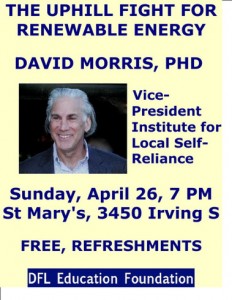Deadline for Comments on Wind Dept. of Health Report
September 15th, 2009
Tomorrow is the deadline for Comments on the PUC’s docket regarding setbacks and the Department of Health’s report on wind turbine placement, noise and public health:
Here’s the PUC’s Notice:
To see the docket, and there have been a lot of comments thus far which might help you in writing up yours:
- Go to www.puc.state.mn.us
- Click on “eDockets” (the blue button)
- Scroll down and enter docket 09-845.
The PUC Notice says that Comments should be filed electronically. To do that:
- Go towww.puc.state.mn.us
- Click on “eFiling” (the orange button)
- Register
- Follow the directions to file.
- If that doesn’t work, email Comments to burl.haar@state.mn.us
Send your comments in before tomorrow at 4:30 p.m. There are many, and we need many more. It’s all about responsible siting that works, reasonable setbacks, sufficient to prevent unreasonable noise and flicker and other impacts to those who live near turbines. Once more with feeling, we need energy we can LIVE WITH!!!
Bill Gates & Otter Tail at the PUC Tuesday…
August 24th, 2009
Yeah, he’s got pie on his face, all right… or is it egg…
Alan would put the headline as “PUC HELPS BILL GATES BUILD COAL PLANTS!”
Anyway, the meeting is Tuesday, TOMORROW… and, well, not Bill Gates directly, but his Cascade Investments. They’re on the PUC agenda tomorrow. Cascade Investments is providing the $$$ to Otter Tail Power build the Big Stone II coal plant, and without Cascade Investments, the Big Stone II coal plant doesn’t get built.
Here’s the Comment that I just sent in:
Otter Tail Power and Cascade Investments are on the agenda at the PUC, item #5, where they’re asking for approval of a “Standstill Agreement” that would allow them to operate in a way prohibited by state law:
Cascade Investments (Bill Gates) is a major investor in Otter Tail Power. You’d think he’d get that building coal plants is not a good investment these days, but nooooooo, there he goes! Over 10% of Otter Tail Power and wanting more, apparently! But wait, Minnesota law limits how investors with over 10% interest and corporations can act:
And here’s where it gets interesting. OES Staff asked what they’re contemplating that would not be possible under Minn. Stat. 302A.673, and they say “business loans.” But as staff noted, business loans are fine, that’s not an issue, it’s more stock that is an issue! Yet despite this non-responsive response, Staff recommends the PUC approve OTP’s and Cascade’s agreement. SAY WHAT??
So tell me, why should OTP get special treatment? This was an issue that the OES Staff noted was not common, had not even been reviewed before!!!
1)NOTICE SUCKED – look at the service list for OTP’s filing, and PUC Notice
2) OTP is asking for special treatment
3) OES asked questions about why and OTP did not answer them satisfactorily
4)What’s the impact on ratepayers? On shareholders? (not that PUC can, or should, have any concern about that!)
5) OTP has burden
6) OTP hasn’t met it
7) Petition should be denied
Makes sense to me…
Bent Tree comment deadline TOMORROW!
July 13th, 2009
 Katie Troe, Safe Wind in Freeborn County
Katie Troe, Safe Wind in Freeborn County
Tomorrow at 4:30 p.m. is the deadline for Comments on the Bent Tree Wind Farm Certificate of Need and Siting docket. This is the 200-400MW wind project that Wisconsin Power & Light wants to build in MINNESOTA for credit towards the Wisconsin Renewable Electricity Standard.
QUICK, send your comments to:
Steve.Mihalchick [at] state.mn.us
For the PUC’s sites, go to www.puc.state.mn.us
Then click on the blue “eDocket” button…
… and search for dockets
08-573 for Siting Docket
07-1425 for Certificate of Need
And there’s also Commerce’s Siting page:
Remember, this is the one that, together with one in Clay County, triggered this White Paper:
Here’s another story in the Albert Lea Tribune with a great “I think they need professional help” quote from Katie Troe:
Safe Wind lobbies state over turbines
By Jason Schoonover | Albert Lea Tribune
Sen. Amy gets visit from Micheletti!
April 30th, 2009
WASHINGTON, D.C. — This morning, at “Coffee and Potica” or Minnesota Morning with Senator Amy Klobuchar, who should be there but Tom Micheletti! Yes, Excelsior Energy’s Tom Micheletti was there. And he was there on the eve of the DEADLINE, the day before the PUC said it would pull the plug on Excelsior Energy’s Mesaba Project.
The legendary Alan Muller, Green Delaware, was in Amy’s office this morning too! He got there, and “the only other person I knew in the room was Tom Micheletti.” Too weird. And here I had to stay home and dogsit. DAMN! I could have used the aerobic exercise of duking it out with Tom again.
Sen. Klobuchar’s energy staffer, Charlie Moore, said he wasn’t in on the conversation between Micheletti and Klobuchar’s chief of staff, Alan said they were huddled together for quite a while. Moore also said that he didn’t know that there was a May 1 deadline. Oh, really? Not good. It’s bad enough that we have to worry about what Micheletti might be saying, but now we’ve also got to be concerned about what he isn’t saying.
And sorry, no photo, yes, I’m MOST disappointed, oh well… but there’s a photo of Sen. Klobuchar with Alan in his Neighbors Against the Burner shirt.
Will it happen? Will they pull the plug? They sure better, they’ve been stalling long enough.
Here’s Excelsior Energy’s filings in their attempt to keep the PUC from FINALLY pulling the plug on the Mesaba Project:
So let’s just let this thing die. Xcel doesn’t want it, the Minnesota municipal utilities don’t want it, the PUC doesn’t want it, and mncoalgasplant.com sure doesn’t want it and neither does Citizens Against the Mesaba Project.
David Morris on PUC process and Capx 2020 decision
April 24th, 2009
Once more, it’s David Morris, Institute for Local Self Reliance, telling it like it is. The PUC process is long over do a complete revamping. It is based on laws and rules that grew out of the 1970s-1980s transmission fights, and gave people a useful and meaningful way to participate in these proceedings. But that’s gone, gone with the 2001 changes, gone with the 2005 Transmission Omnibus Bill from Hell, and we’re left with just about nothing. In other states, there’s Intervenor Compensation which allows Intervenors the ability to pay for expert witnesses, there are free transcripts as a matter of course, and there’s encouragement and support of Intervenors, not a drive to push them out of the process that we see here, that we saw in this CapX proceeding, when the ALJ tried to boot out U-CAN; that we saw in the Excelsior Energy docket (scroll down to “Fourth Prehearing Order”).
David Morris: If it’s citizens vs. utilities, utilities win
The PUC has an approval process that stacks the deck against the public.
By DAVID MORRIS
Last update: April 23, 2009 – 6:50 PM
A few days ago, the Minnesota Public Utilities Commission (PUC) approved a massive high-voltage transmission project known as CapX that will cost Minnesotans an amount equal to the projected biennial state budget deficit and four times the total bill to taxpayers for the Twins and Gophers stadiums.
With respect to the stadiums, Minnesotans were able to actively participate in the decisions, both directly and indirectly through elected representatives. Both those in favor and those opposed to using tax dollars to pay for the stadiums engaged in a spirited public debate. The Legislature is currently just as vigorously debating ways it can eliminate the budget deficit.
The PUC process, on the other hand, is much more hostile to citizen participation and influence. Indeed, the deck is stacked against the average citizen. Utilities have a virtually unlimited budget to argue their positions — a budget they raise from their ratepayers. Citizens, on the other hand, must raise their own money, and lots of it, to participate effectively.
The rules under which the PUC operates are established by the Legislature. Utility lobbyists are powerful there. But they’re not all-powerful. Thus, over the years, Minnesotans have been able to enact rules to help level the playing field for citizens. For example, the law requires the PUC to reject an application to build a large power plant or a high-voltage transmission line unless the utility proves it is needed to improve reliability or meet increased demand or achieve renewable-energy goals. As part of the application, the utility is expected to thoroughly and completely explore alternatives to its proposal, including no-build options. The burden of proof on whether a project is needed rests with the utilities.
The PUC, regrettably, has interpreted this rule so as to turn it on its head. At the PUC, the burden of proof rests with those opposed to a new power plant or high-voltage transmission line. It is up to the people whose homes and farms may be seized by utilities if a project is approved to make the case for alternatives. Doing so requires an extremely high level of technical expertise. A serious technical and economic examination of alternatives can cost $100,000 to $200,000 or more.
Even if citizens are able to raise that kind of money, they face other hurdles. To analyze alternatives, they must access data that only utilities possess. In many cases, the utilities call that data proprietary and argue that to make the information public is to give a possible advantage to a competitor. One would think that this would be a hard argument to make. After all, Minnesota utilities have a monopoly on the sale of electricity. Apparently, however, it is not a hard argument to make at the PUC.
A formal proceeding, such as a judicial proceeding, involves the cross-examination of witnesses. In many proceedings, utilities again tax their customers by using ratepayer money to acquire a transcript. One would think that since the transcript is in electronic form, the PUC would post it and make it freely available to the public. Astonishingly, the PUC rules state that court reporters own the transcript! Citizens and other intervenors must pay for their own copies of transcripts, which, for controversial projects, could mean $5,000 to $10,000 per copy.
In the recent CapX transmission case, the PUC went one step further in denying citizens. The need for the transmission lines was based in large part on a projection of significantly increasing demand. That projection was largely made in forecasts completed in 2004. It has already proven to be vastly overstated. Moreover, the current economic collapse is translating into shrinking, not growing, electricity demand. Hundreds of citizens asked the PUC to take this new information into account and keep the proceeding open. The PUC decided the current economic free fall doesn’t make a difference.
Utilities are gearing up to ask the PUC to spend billions more for even higher-voltage transmission lines. These will be built to send electricity from the Dakotas to Chicago and New York while running right through Minnesota. If these lines are approved, Minnesotans will probably pay most of the costs, while receiving little if any benefit.
Imagine if legislators proposed taxing us to build a sports stadium in Chicago. The proposal would be dead on arrival. Citizens have influence and even power in the Legislature. The process and rules at the PUC must be redesigned to allow them similar access and influence over energy decisions.
David Morris is vice president of the Institute for Local Self-Reliance, based in Minneapolis and Washington, D.C.


